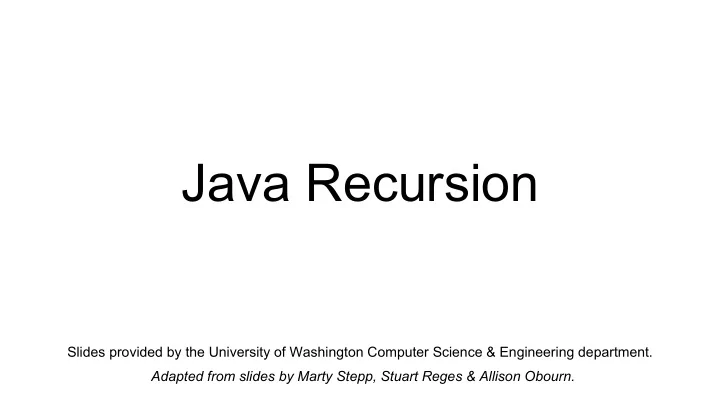

Java Recursion Slides provided by the University of Washington Computer Science & Engineering department. Adapted from slides by Marty Stepp, Stuart Reges & Allison Obourn.
Recursion - recursion : The definition of an operation in terms of itself - Solving a problem using recursion depends on solving smaller occurrences of the same problem. - recursive programming: Writing methods that call themselves to solve problems recursively - An equally powerful substitute for iteration (like for- loops) - Particularly well-suited for solving certain types of problems
Recursion and cases - Every recursive algorithm involves at least 2 cases: - base case: A simple occurrence that can be answered directly - recursive case: A more complex occurrence of the problem that cannot be directly answered, but can instead be described in terms of smaller occurrences of the same problem - Some recursive algorithms have more than one base or recursive case, but all have at least one of each. - A crucial part of recursive programming is identifying these cases.
Recursion in Java - Consider the following method to print a line of * characters: // Prints a line containing the given number of stars. // Precondition: n >= 0 public static void printStars(int n) { for (int i = 0; i < n; i++) { System.out.print("*"); } System.out.println(); // end the line of output } - Write a recursive version of this method that calls itself. - Solve the problem without using any loops. - Hint: your solution should print just one star at a time.
Recursion in Java - Our recursive solution is split into two cases: - base case: print 0 stars - recursive case : print more than 0 stars - In Java: public static void printStars(int n) { if (n == 0) { // base case; just end the line of output System.out.println(); } else { // recursive case; print one zero stars System.out.print("*"); printStars(n - 1); } }
Recursive tracing - Consider the following recursive method: public static int mystery(int n) { if (n < 10) { return n; } else { int a = n / 10; int b = n % 10; return mystery(a + b) ; } } - What is the result of the following call? mystery(648)
A recursive trace mystery(648): - int a = 648 / 10; // 64 - int b = 648 % 10; // 8 - return mystery(a + b); // mystery(72) mystery(72): - int a = 72 / 10; // 7 - int b = 72 % 10; // 2 - return mystery(a + b); // mystery(9) mystery(9): - return 9;
Recursive tracing 2 - Consider the following recursive method: public static int mystery(int n) { if (n < 10) { return (10 * n) + n; } else { int a = mystery(n / 10) ; int b = mystery(n % 10) ; return (100 * a) + b; } } - What is the result of the following call? mystery(348)
A recursive trace 2 mystery(348): - int a = mystery(34); - int a = mystery(3); - return (10 * 3) + 3; // 33 - int b = mystery(4); - return (10 * 4) + 4; // 44 - return (100 * 33) + 44; // 3344 - int b = mystery(8); - return (10 * 8) + 8; // 88 - return (100 * 3344) + 88; // 334488
Recommend
More recommend